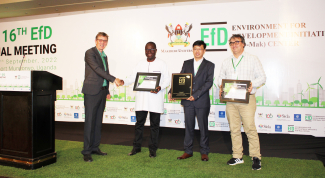We can incorporate agriculture ecosystems into urban green economy in Tanzania: Dar es Salaam households are willing to pay
We are living in a crisis era, with competing land use for finite land and ill-informed myopic urban land-use policies that remain stagnant, in a world with a rapidly changing urban environment, such as the mushrooming urban agriculture. While smallholder farms in and around cities, in sub-Saharan Africa, provide many ecosystem services including boosting household income and nutrition, and access to land constraints these benefits. This paper examines the willingness to pay for urban farm plots, using a random parameter logit model.
Impacts of climate‐smart crop varieties and livestock breeds on the food security of smallholder farmers in Kenya
AbstractThis paper analyses the impact of climate-smart agriculture (CSA) technologies on household dietary diversity and food insufficiency as indicators of food and nutrition security in Kenya. Using a combination of Propensity Score Matching and endogenous treatment effect approaches, we found that adoption of stress-tolerant varieties of several crops (such as bean, pigeon pea, cowpea, maize and sorghum) improved household dietary diversity score by 40% and reduced food insufficiency by 75%.
Incorporating Just Transitions in Kenya’s Low-Carbon Economy Development Path
Despite its low contribution to global greenhouse gas (GHG) emissions, Kenya bears a disproportionate burden of climate change impacts, which have been exacerbated by COVID-19. These impacts are disrupting the country’s economic performance, as seen in sectors such as agriculture, tourism, forestry, water, and transport. In many cases, the catastrophic effects of climate change are most disruptive to vulnerable groups, such as the poor, women, and children.
Government performance, geophysical-related disasters, and institutional trust: A comparison of Chilean and Haitian responses after an earthquake
This article investigates the effect of government performance assessment after the 2010 earthquakes in Chile and Haiti on institutional trust. Available data from the 2010/2012 AmericasBarometer survey are used to estimate the immediate effects and those linked to the rebuilding process. Results show that performance assessment of Chilean institutions’ ability to manage the earthquake positively affected institutional trust, whereas the above relationship only holds for Haitian municipalities and the National Police.
Extreme weather events and pro-environmental behavior: evidence from a climate change vulnerable country
Experiencing an extreme weather event and its consequences might make the risks associated with climate change more tangible, easier to evaluate, and more salient. Consequently, those experiences might translate into the adoption of pro-environmental behaviours. Understanding this relationship is fundamental for the successful design of policies aimed toward promoting the adoption of climate change adaptation and mitigation measures.
The pollution haven strikes back?–Evidence from air quality daily variation in the Jing-Jin-Ji region of China
Pollution havens create environmental inequality issues. China’s recent policy of directing high-pollution firms to migrate out of its capital, Beijing, offers a case of a pollution haven that was mandated, rather than resulting from firms’ responses to environmental regulation. More importantly, it leads to a question that has been less discussed in previous literature: does a pollution haven strike back?
Three win the EfD Policy Impact Award during the 16th EfD Annual meeting in Uganda
Three research teams were on 25th September 2022 awarded the EfD Policy Impact Award during the 16th EfD Annual meeting held at the Speke Resort Hotel Munyonyo Kampala Uganda. The award is to
Pagination
- Previous page
- Page 20
- Next page

